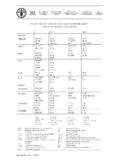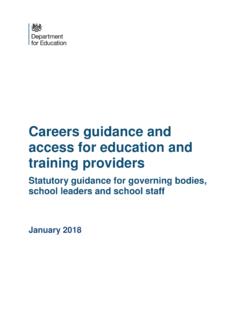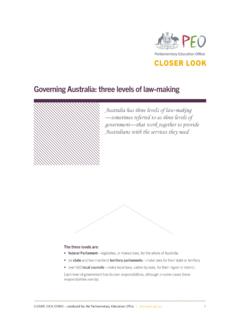Transcription of Supporting pupils at school with medical conditions
1 Supporting pupils at school with medical conditions Statutory guidance for governing bodies of maintained schools and proprietors of academies in England December 2015 2 Contents Summary 3 About this guidance 3 Expiry or review date 3 What legislation is this guidance issued under? 3 Who is this guidance for? 4 Key points 4 Introduction 5 The role of governing bodies , proprietors and management committees 7 Developing the school s policy 8 Other issues for consideration 25 Further sources of information 26 Other safeguarding legislation 26 Other relevant legislation 27 Asso ciated resources 27 Annex A: Model process for developing individual healthcare plans 28 3 Summary About this guidance This document contains both statutory guidance and non- statutory advice. The non-statutory advice is presented in text boxes. The statutory guidance applies to any appropriate authority as defined in section 100 of the Childre n and Families Act 2014.
2 That means governing bodies in the case of maintained schools, proprietors in the case of academies and management committees in the case of pupil referral units (PRUs). Appropriate authorities must have regar d to1 this guidance when carr ying out their statutory duty to make arrangements to support pupils at school with medical conditions . The guidance also applies to activities taking place off -site as part of n ormal educational activities. In this document, references to schools are take n to incl ude academies and PRUs and references to governing bodies in clude proprietors in academies and management committees of PRUs. Further advice, where provided, is based on good practice but is non- statutory. Early years settings should contin ue to apply the Statutory Framework for t he Early Years Foundation This document replaces an earlier version of this guidance publis hed in September 2014.
3 Previous guidance on managing medicines in schools and early years settings was published in March 2005. Expiry or review date This document will be reviewed in autumn 2017. What legislation is this guidance i ssued under? Section 100 of the Children and Families Act 2014 places a duty on governing bodies of maintained schools, proprietors of academies and management committees of PRUs to make arrangements for Supporting pupils at their school with medical conditions . 1 This means to take account of the guidance and to carefully consider it. Having done so, there would need to be a good reason to justify not complying with it. 2 -foundation-stage -framework--2 4 In meeting the duty, the governing body, proprietor or management committee must have regard to guidance issued by the Secretary of State under this section. This guidance came into force on 1 September 2014.
4 Who is this guidance for? This statutory guidance applies to: governing bodies of maintained schools (excluding maintained nursery schools) management committees of PRUs proprietors of academies, including alternative provision academies (but not including 16 19 academies) This guidance is also provided to assist and guide: schools, academies (including alternative provision academies) and PRUs local authorities clinical commissioning groups (CCGs), NHS England anyone who has an interest in promoting the wellbeing and academic attainment of children with medical conditions , including alternative provision, independent schools parents/carers3 and pupils health service providers Key points pupils at school with medical conditions should be properly supported so that they have full access to education, including school trips and physical education.
5 governing bodies must ensure that arrangements are in place in schools to support pupils at school with medical conditions . governing bodies should ensure that school leaders consult health and social care professionals, pupils and parents to ensure that the needs of children with medical conditions are properly understood and effectively supported. 3 All further references to a parent or parents also includes a carer or carers 5 Introduction 1. On 1 September 2014 a new duty came into force for governing bodies to make arrangements to support pupils at school with medical conditions . The statutory guidance in this document is intended to help governing bodies meet their legal responsibilities and sets out the arrangements they will be expected to make, based on good practice. The aim is to ensure that all children with medical conditions , in terms of both physical and mental health, are properly supported in school so that they can play a full and active role in school life, remain healthy and achieve their academic potential.
6 2. Parents of children with medical conditions are often concerned that their child s health will deteriorate when they attend school . This is because pupils with long-term and complex medical conditions may require ongoing support, medicines or care while at school to help them manage their condition and keep them well. Others may require monitoring and interventions in emergency circumstances. It is also the case that children s health needs may change over time, in ways that cannot always be predicted, sometimes resulting in extended absences. It is therefore important that parents feel confident that schools will provide effective support for their child s medical condition and that pupils feel safe. In making decisions about the support they provide, schools should establish relationships with relevant local health services to help them. It is crucial that schools receive and fully consider advice from healthcare professionals and listen to and value the views of parents and pupils .
7 3. In addition to the educational impacts, there are social and emotional implications associated with medical conditions . Children may be self-conscious about their condition and some may be bullied or develop emotional disorders such as anxiety or depression around their medical condition. In particular, long-term absences due to health problems affect children s educational attainment, impact on their ability to integrate with their peers and affect their general wellbeing and emotional health. Reintegration back into school should be properly supported so that children with medical conditions fully engage with learning and do not fall behind when they are unable to attend. Short-term and frequent absences, including those for appointments connected with a pupil s medical condition (which can often be lengthy), also need to be effectively managed and appropriate support put in place to limit the impact on the child s educational attainment and emotional and general wellbeing.
8 Some children with medical conditions may be considered to be disabled under the definition set out in the Equality Act 2010. Where this is the case governing bodies must comply with their duties under that Act. Some may also have special educational needs (SEN) and may have a statement, or Education, Health and Care (EHC) plan which brings together health and social care needs, as well as their special educational provision. For children with SEN, this guidance should be read in conjunction with the 6 Special educational needs and disability (SEND) code of practice4 The Special educational needs and disability code of practice explains the duties of local authorities, health bodies , schools and colleges to provide for those with special educational needs under part 3 of the Children and Families Act 2014. For pupils who have medical condit ions that require EHC plans, compliance with the SEND code of practice will ensure compliance with this guidance with respect to those children.
9 4 of-practice-0- to -25 7 The role of governing bodies , proprietors and management committees 4. In meeting the duty to make arrangements to support pupils with medical conditions , functions can be conferred on a governor, a headteacher, a committee or other member of staff as appropriate. Help and co-operation can also be enlisted from other appropriate persons. We expect that an approach to meeting the duty will be taken in light of the statutory guidance. This will inform the school and others about what needs to be done in terms of implementation. However, the governing body, proprietor or management committee remains legally responsible and accountable for fulfilling its statutory duty. 5. The governing body5 must ensure that arrangements are in place to support pupils with medical conditions . In doing so it should ensure that such children can access and enjoy the same opportunities at school as any other child.
10 Further advice: Schools, local authorities, health professionals, commissioners and other support services should work together to ensure that children with medical conditions receive a full education. In some cases this will require flexibility and involve, for example, programmes of study that rely on part-time attendance at school in combination with alternative provision arranged by the local authority6. Consideration may also be given to how children will be reintegrated back into school after periods of absence. 6. In making their arrangements, governing bodies should take into account that many of the medical conditions that require support at school will affect quality of life and may be life-threatening. Some will be more obvious than others. governing bodies should therefore ensure that the focus is on the needs of each individual child and how their medical condition impacts on their school life.















